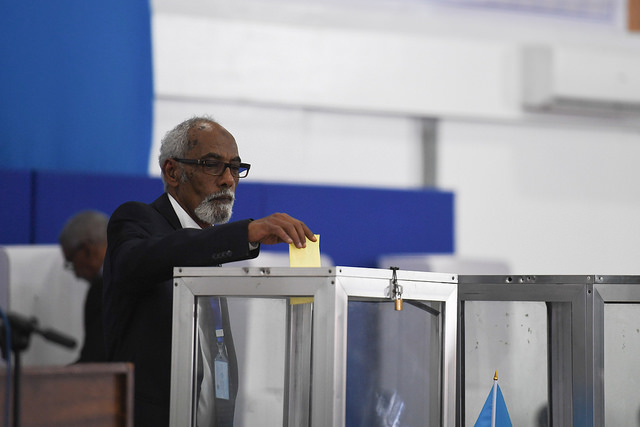Universal vote in Somalia complicated by Covid-19-Crisis Group

Somalia might have to forego its ambition of a universal vote this year and retain the 2016/17 model in light of the pervasive COVID-19 pandemic, the think tank International Crisis Group has said but warned such a move must garner broad-based consensus.
In a brief, COVID-19 in Somalia: A Public Health Emergency in an Electoral Minefield released Friday, Crisis Group noted the ongoing global pandemic which is fast spreading in Somalia and an already complex political situation in the country could make it difficult for Somalia to attain its goal of one-person-one-vote.
In the brief, Crisis Group is proposing Somalia make adjustments to its electoral plan which could include ‘abandoning plans for a one-person, one-vote election and instead providing for some form of an electoral college system, as was used in the 2016-2017 vote, whereby some 14,000 delegates selected the representatives for 275 parliamentary seats.’
CONSENSUS
Such an adjustment, Crisis Group said will minimize risks to public health by cutting off the need for mass registration and mobilization. However, Crisis Group warned, such changes must be backed by agreement from various stakeholders, failure to which another political crisis could unravel.
“Unilateral decision-making could prove perilous, given the high degree of polarisation and the readiness for confrontation some actors display,” the brief read in part.
U.S ambassador to Somalia Donald Yamamoto told journalists Thursday it was upon Somalis to adjust the electoral timelines noting his country had set aside funds to support the process.
“Election lies with the people of Somalia. If you want to decide to delay slightly, that is your decision,” said Yamamoto.
OPPORTUNITY FOR ENGAGEMENT
Crisis Group senior analyst for Somalia Omar Mahmood told Goobjoog News COVID-19 might however present an opportunity for the Federal Government, the Federal Member States and opposition parties to engage and find a way forward to the elections stalemate.
“The pandemic undoubtedly adds another layer of complexity to the elections, especially since that process was already difficult and contentious,” said Mahmood. “But it also presents an opportunity to re-examine positions around it, given that business as usual is not possible.”
According to Mahmood, the COVID-19 pandemic, added to existing challenges such as acute food shortage, perennial floods and Al-Shabaab threats among others could herald a political crisis should dialogue fail.
On the possible impact of COVID-19 on Somalia’s debt relief process, Mahmood avers Somalia could still be on course owing to the global nature of the pandemic which has caused international creditors and financial institutions to relax debt obligations.
“In line with the unprecedented nature of COVID-19 and the pragmatism displayed,” Mahmood said, “It should be possible for Somalia to continue negotiations in a manner that takes into account the demands and impact of COVID-19, so as to avoid either hindering the government’s response to the crisis, or erasing the positive gains made so far in reducing its debt burden.”